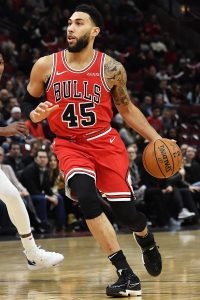Since we published the first installment of our 2020 free agent power rankings in November, there haven’t been a ton of injuries, contract extensions, or other developments that will shake up our list in our major way. However, with a handful of free-agents-to-be enjoying breakout years and others struggling, it’s time for an update.
The biggest change this time around is the fact that Mike Conley and Otto Porter no longer show up in our top-20 list. That doesn’t mean that Conley or Porter wouldn’t be one of the top 20 players on the open market this summer if they reach free agency. But due to injuries – and up-and-down play when they’ve been on the court – I no longer feel confident projecting them to even become free agents.
As our full list of potential 2020 free agents shows, Conley has an early termination option worth approximately $34.5MM for next season, while Porter has a player option worth nearly $28.5MM. Unless they make very strong second-half comebacks, I’d be surprised if either player opts out of his contract at season’s end, since they seem highly unlikely to match those 2020/21 salaries on new deals. As such, they’ve been removed from our list of 2020’s top free agents for the time being.
As usual, our list reflects each player’s current expected value on the 2020 free agent market, rather than a their present-day on-court contributions. For instance, older players like Marc Gasol and Paul Millsap have strong short-term value, but didn’t crack our top 20 because they’ll be 35 next summer and are unlikely to sign huge, long-term deals. In other words, age and long-term value are important.
With all that in mind, here’s the second installment of our 2020 free agent power rankings:
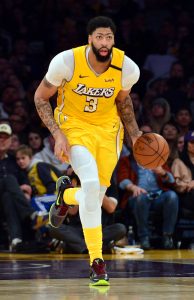 Anthony Davis, F/C, Lakers (player option): The No. 1 player on our board is the only legit superstar on track to reach unrestricted free agency this summer. If anything, Davis’ position atop this list is even more secure than it was at the start of the season, since he has posted MVP-type numbers (26.5 PPG, 9.1 RPG, 3.2 APG, 2.5 BPG) for a Lakers team that leads the Western Conference.
Anthony Davis, F/C, Lakers (player option): The No. 1 player on our board is the only legit superstar on track to reach unrestricted free agency this summer. If anything, Davis’ position atop this list is even more secure than it was at the start of the season, since he has posted MVP-type numbers (26.5 PPG, 9.1 RPG, 3.2 APG, 2.5 BPG) for a Lakers team that leads the Western Conference.- Brandon Ingram, F, Pelicans (RFA): While waiting seemed like the safe bet at the time, the Pelicans may be wishing they’d locked up Ingram to a long-term extension during the preseason. The 22-year-old has exceeded all expectations so far in New Orleans, combining strong scoring numbers (25.0 PPG on .471/.404/.856 shooting) with improving play-making (4.3 APG) and earning his first All-Star nod.
- Andre Drummond, C, Pistons (player option): Although Drummond continues to hold the No. 3 spot on our list thanks to his elite rebounding (15.6 RPG) and defensive ability (2.1 SPG, 1.8 RPG), I’d be a little nervous about giving him a long-term, maximum-salary contract this offseason. It sounds like NBA teams share that concern, considering the Pistons are willing to move him and the Hawks reportedly backed off their pursuit due to his asking price.
- Gordon Hayward, F, Celtics (player option): It won’t be a simple decision for Hayward to turn down his $34MM+ player option for 2020/21. However, that scenario seems increasingly likely as long as he stays healthy and keeps playing like he has. He has essentially posted a 50/40/90 shooting line for the month of January and his overall numbers match up favorably with those from his All-Star 2016/17 season in Utah.
- Fred VanVleet, G, Raptors: In our first 2020 free agent power rankings, I expressed some trepidation about making VanVleet the top point guard in my board. That looks like a much safer bet now, as the 25-year-old has been a key cog driving the success of the second-seeded Raptors. A rebuilding team with cap room and a hole at point guard – such as the Knicks – could drive up the price on VanVleet this offseason.
- DeMar DeRozan, G/F, Spurs (player option): DeRozan will turn 31 this summer and his ongoing resistance to expanding his shooting range may limit his appeal in free agency. Still, it’s hard to move the four-time All-Star much further down this list when he continues to produce like he has lately. DeRozan is generating rebounds and assists at a career-high rate since joining the Spurs and his .535 FG% this season blows away his previous career high — he may not shoot three-pointers, but he’s certainly an efficient scorer.
- Bogdan Bogdanovic, G/F, Kings (RFA): Bogdanovic’s numbers don’t jump off the page, but his contributions go beyond his somewhat pedestrian box score. He’s capable of running an offense, playing on or off the ball, spacing the floor, and holding his own on defense, making him the sort of all-around contributor who would fit perfectly on any roster.
- Montrezl Harrell, C, Clippers: The fact that so many of Harrell’s minutes come against bench units may make suitors wary of his production. Still, that production (19.3 PPG and 7.2 RPG in 28.7 MPG) is hard to deny, and his underlying rim-protection numbers are pretty solid too. It’ll be fascinating to see how big a raise the 26-year-old gets on this year’s $6MM salary in July.
- Danilo Gallinari, F, Thunder: Gallinari’s numbers have dipped ever so slightly this season in Oklahoma City, but it’s still been an encouraging year for the Thunder forward, who has maintained a scoring average of 19+ PPG and – most importantly – stayed healthy. He’d rank higher on this list if he were a few years younger. Since he’ll be entering his age-32 season later this year and has a history of injury issues, teams may be reluctant to invest major long-term money.
- Evan Fournier, G/F, Magic (player option): Fournier is enjoying a career year in Orlando, with 18.8 PPG on .464/.396/.816 shooting. His ability to knock down outside looks and create his own shot is valuable, and he’s still just 27 years old.
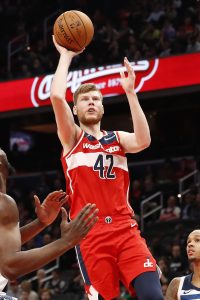 Davis Bertans, F, Wizards: Bertans narrowly missed a spot on the top 20 in the previous installment of our power rankings. It’s impossible to keep him off the list now, amid ongoing chatter that he could be looking at $15MM per year on his next deal. Incredibly, Bertans has nearly doubled his rate of three-point attempts per game this year – from 4.4 to 8.5 – while still ranking among the league leaders in 3PT% (.422).
Davis Bertans, F, Wizards: Bertans narrowly missed a spot on the top 20 in the previous installment of our power rankings. It’s impossible to keep him off the list now, amid ongoing chatter that he could be looking at $15MM per year on his next deal. Incredibly, Bertans has nearly doubled his rate of three-point attempts per game this year – from 4.4 to 8.5 – while still ranking among the league leaders in 3PT% (.422).- Dillon Brooks, F, Grizzlies (RFA): Like Bertans, Brooks may not have looked like a top 2020 free agent last fall, but a career year has significantly raised his stock. Besides averaging 16.3 PPG with a .404 3PT%, Brooks has played tough, physical defense and hasn’t missed a game, helping lead the overachieving Grizzlies to a .500 record and the No. 8 seed. His frequent foul trouble is a bit concerning, but Brooks is a three-and-D wing who just turned 24 years old — he’s headed for a nice payday.
- Serge Ibaka, F/C, Raptors: After playing an important role in the Raptors’ championship run in the spring, Ibaka is having his arguably best year yet in Toronto. While many of his per-game averages are nearly identical to last season’s, his .381 3PT% represents a major step up on last year’s .290 mark and has helped the Raps’ offense remain dangerous without Kawhi Leonard.
- Marcus Morris, F, Knicks: Having averaged between 13.6 and 14.1 PPG for four consecutive seasons, Morris is blowing away his previous career highs with 19.2 PPG and a .439 3PT%. Are those numbers an aberration? A byproduct of becoming the de facto No. 1 option in New York? Some combination of both? Teams will have to answer those questions as they weigh whether to pursue the 30-year-old this summer.
- Jerami Grant, F, Nuggets (player option): Following a very slow start to the season in Denver, Grant has righted the ship, particularly since entering the starting lineup on January 8. In the 12 games since then, he has averaged 15.5 PPG on .474/.432/.780 shooting while being his usual versatile self on defense. This is the version of Grant the Nuggets were expecting when they gave up a first-round pick for him last July.
- Derrick Favors, C, Pelicans: Favors has been limited by injuries this season and his role has been somewhat complicated by Zion Williamson‘s return. But he’s averaging 10.0 RPG in part-time minutes and his on/off-court numbers reflect his value. New Orleans has a +2.2 net rating when he plays (-4.5 when he sits) and is nearly a .500 team (13-14) when he’s in the starting lineup. The club is just 6-13 in the games he has missed.
- Joe Harris, G/F, Nets: Harris’ name may have been left out when Kyrie Irving provided the media with his impromptu list of Nets building blocks earlier this month, but the swingman’s ability to score and spread the floor has been crucial again this season. Brooklyn’s offense has cratered – from a 108.4 rating to just 98.2 – when he’s on the bench.
- Tristan Thompson, C, Cavaliers: With a double-double average (12.0 PPG, 10.4 RPG) for the second consecutive year, Thompson has been one of the few bright spots in an otherwise dreadful Cavaliers season. When he reaches free agency as a 29-year-old this summer, it’ll be interesting to see whether he sticks out Cleveland’s rebuilding project or jumps ship to a contender.
- Tim Hardaway Jr., G/F, Mavericks (player option): If Hardaway weren’t earning $20MM, he’d be considered underrated. He’s connecting on 39.5% of 6.7 three-point attempts per game and has developed into a reliable member of Luka Doncic‘s supporting cast in Dallas.
- Hassan Whiteside, C, Trail Blazers: It’s hard to know how to properly rate Whiteside’s value. He’s a maximum-salary player who continues to put up some of the NBA’s best rebounding (14.0 RPG) and block (3.1 BPG) numbers. But the Heat have thrived after jettisoning Whiteside and the Trail Blazers have struggled since he became their starting center. Potential suitors will have to assess just how much value Whiteside’s individual stats actually provide.
Disagree strongly with any of our rankings? Feel like we omitted any players that should be in the top 20? Weigh in below in the comments section to let us know!
Photos courtesy of USA Today Sports Images.
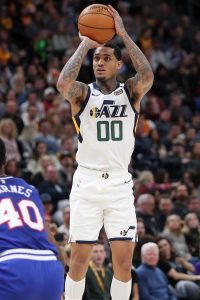 In December, the Jazz
In December, the Jazz 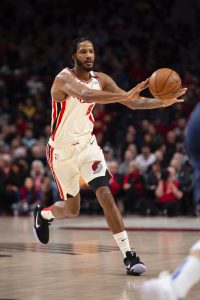 Ariza ($12,200,000), Swanigan ($2,033,160), and Gabriel ($1,445,697) for Bazemore ($19,269,662).
Ariza ($12,200,000), Swanigan ($2,033,160), and Gabriel ($1,445,697) for Bazemore ($19,269,662).
